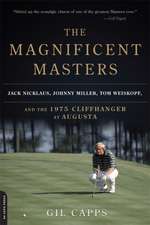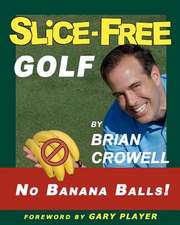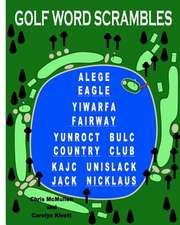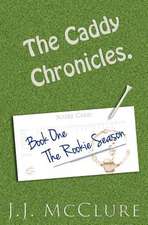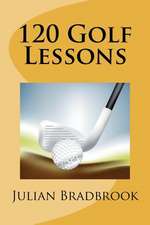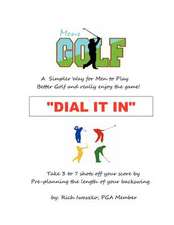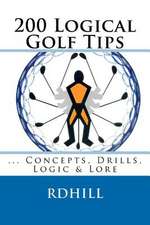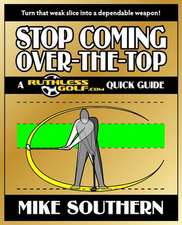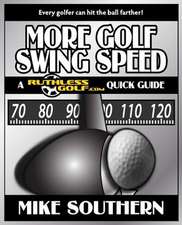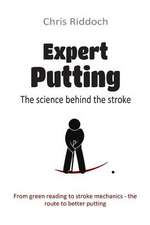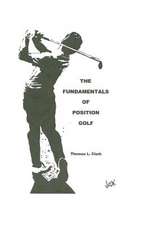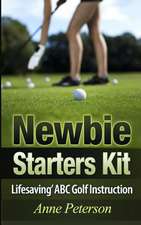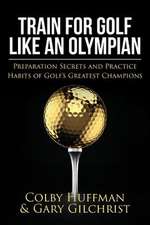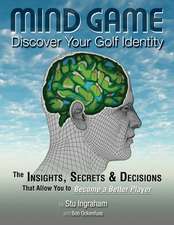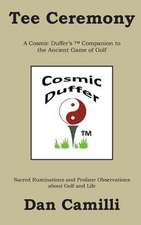Routledge International Handbook of Golf Science: Routledge International Handbooks
Editat de Martin Tomsen Limba Engleză Hardback – 26 oct 2017
Showcasing original research from leading golf scientists across the globe, it examines the fundamental science underpinning the game and demonstrates how it can be applied in practice to improve and develop players. Each chapter provides a definitive account of the current state of knowledge in a particular area of golf science, addressing the limitations of existing research, presenting new areas for development and discussing the implications for coaches, players, scientists and the wider golfing public. Truly international in scope, the variety of topics explored include:
- biomechanics and equipment
- skill learning and technology
- performance development
- psychological techniques for success
- the golfing body.
| Toate formatele și edițiile | Preț | Express |
|---|---|---|
| Paperback (1) | 328.11 lei 22-36 zile | +34.79 lei 5-11 zile |
| Taylor & Francis – 25 feb 2020 | 328.11 lei 22-36 zile | +34.79 lei 5-11 zile |
| Hardback (1) | 1348.16 lei 43-57 zile | |
| Taylor & Francis – 26 oct 2017 | 1348.16 lei 43-57 zile |
Din seria Routledge International Handbooks
-
 Preț: 371.78 lei
Preț: 371.78 lei -
 Preț: 375.50 lei
Preț: 375.50 lei -
 Preț: 362.19 lei
Preț: 362.19 lei -
 Preț: 352.08 lei
Preț: 352.08 lei - 9%
 Preț: 1487.70 lei
Preț: 1487.70 lei - 5%
 Preț: 317.31 lei
Preț: 317.31 lei -
 Preț: 372.05 lei
Preț: 372.05 lei -
 Preț: 361.19 lei
Preț: 361.19 lei -
 Preț: 390.13 lei
Preț: 390.13 lei -
 Preț: 311.91 lei
Preț: 311.91 lei - 9%
 Preț: 1488.67 lei
Preț: 1488.67 lei -
 Preț: 390.22 lei
Preț: 390.22 lei -
 Preț: 347.74 lei
Preț: 347.74 lei -
 Preț: 347.74 lei
Preț: 347.74 lei - 9%
 Preț: 1490.11 lei
Preț: 1490.11 lei -
 Preț: 356.22 lei
Preț: 356.22 lei -
 Preț: 348.27 lei
Preț: 348.27 lei - 5%
 Preț: 328.11 lei
Preț: 328.11 lei -
 Preț: 394.24 lei
Preț: 394.24 lei - 8%
 Preț: 392.89 lei
Preț: 392.89 lei - 8%
 Preț: 422.42 lei
Preț: 422.42 lei -
 Preț: 357.22 lei
Preț: 357.22 lei - 8%
 Preț: 421.97 lei
Preț: 421.97 lei - 5%
 Preț: 452.16 lei
Preț: 452.16 lei -
 Preț: 341.55 lei
Preț: 341.55 lei - 9%
 Preț: 1651.61 lei
Preț: 1651.61 lei - 9%
 Preț: 1665.70 lei
Preț: 1665.70 lei -
 Preț: 381.91 lei
Preț: 381.91 lei -
 Preț: 350.20 lei
Preț: 350.20 lei -
 Preț: 347.74 lei
Preț: 347.74 lei - 20%
 Preț: 1401.00 lei
Preț: 1401.00 lei -
 Preț: 342.76 lei
Preț: 342.76 lei -
 Preț: 345.63 lei
Preț: 345.63 lei -
 Preț: 345.16 lei
Preț: 345.16 lei -
 Preț: 353.88 lei
Preț: 353.88 lei -
 Preț: 1057.72 lei
Preț: 1057.72 lei -
 Preț: 348.05 lei
Preț: 348.05 lei - 5%
 Preț: 337.33 lei
Preț: 337.33 lei -
 Preț: 365.90 lei
Preț: 365.90 lei - 9%
 Preț: 1528.86 lei
Preț: 1528.86 lei -
 Preț: 346.77 lei
Preț: 346.77 lei -
 Preț: 392.48 lei
Preț: 392.48 lei - 9%
 Preț: 1454.51 lei
Preț: 1454.51 lei - 5%
 Preț: 326.85 lei
Preț: 326.85 lei -
 Preț: 346.11 lei
Preț: 346.11 lei -
 Preț: 361.74 lei
Preț: 361.74 lei - 9%
 Preț: 1349.74 lei
Preț: 1349.74 lei - 19%
 Preț: 422.81 lei
Preț: 422.81 lei - 8%
 Preț: 385.56 lei
Preț: 385.56 lei
Preț: 1348.16 lei
Preț vechi: 1636.68 lei
-18% Nou
Puncte Express: 2022
Preț estimativ în valută:
257.96€ • 270.06$ • 213.45£
257.96€ • 270.06$ • 213.45£
Carte tipărită la comandă
Livrare economică 07-21 aprilie
Preluare comenzi: 021 569.72.76
Specificații
ISBN-13: 9781138189126
ISBN-10: 113818912X
Pagini: 490
Ilustrații: 44 Line drawings, black and white; 4 Halftones, black and white; 19 Tables, black and white; 48 Illustrations, black and white
Dimensiuni: 174 x 246 x 30 mm
Greutate: 1.06 kg
Ediția:1
Editura: Taylor & Francis
Colecția Routledge
Seria Routledge International Handbooks
Locul publicării:Oxford, United Kingdom
ISBN-10: 113818912X
Pagini: 490
Ilustrații: 44 Line drawings, black and white; 4 Halftones, black and white; 19 Tables, black and white; 48 Illustrations, black and white
Dimensiuni: 174 x 246 x 30 mm
Greutate: 1.06 kg
Ediția:1
Editura: Taylor & Francis
Colecția Routledge
Seria Routledge International Handbooks
Locul publicării:Oxford, United Kingdom
Public țintă
Postgraduate and UndergraduateCuprins
Editor's Introduction [Martin Toms]. Acknowledgements. Part I: Biomechanics and Equipment Part Introduction [Sasho MacKenzie] 1. The Golf Coaching-Biomechanics Interface [Andrew Morrison and Eric S. Wallace] 2. The Use of Ground Reaction Forces and Pressures in Golf Swing Instruction [Scott K. Lynn and Will Wu] 3. The Sequence of Body Segment Interactions in the Golf Swing [Peter F. Lamb and Paul S. Glazier] 4. The Kinematic Sequence: Achieving an Efficient Downswing [Robert J. Neal] 5. Inter- and Intra-Individual Movement Variability in the Golf Swing [Paul S. Glazier and Peter F. Lamb] 6. How the Shaft of a Golf Club Influences Performance [Sasho MacKenzie] Part II: Skill Learning and Technology Part Introduction [Sam Robertson] 7. Is Technology the Saviour or the Downfall of Modern Golf Instruction? [Aaron L. Pauls, Christopher P. Bertram and Mark A. Guadagnoli] 8. Optimizing Golf Skill Learning [Gabriele Wulf, Steven Orr and Guillaume Chauvel] 9. Putting Implicit Motor Learning into Golf Practice [Jamie Poolton and Rich Masters] 10. Factors Influencing the Effectiveness of Modelling Golf Technique [Bob Christina and Eric Alpenfels] 11. The Stages of Learning and Implications for Optimized Learning Environments [Christopher P. Bertram, Mark A. Guadagnoli and Ronald G. Marteniuk] 12. Skill Testing in Golf [Sam Robertson] 13. Designing Optimal Golf Practice Environments [Sam Robertson and Damian Farrow] Part III: Performance Development Part Introduction [Marc Lochbaum] 14. Putting; a New Direction-Distance Problem [Matthew W. Bridge and Nicholas Middleton] 15. The Beginning Golfer: Psychological Techniques and Constructs Impacting Affecting Performance [Marc Lochbaum, Zişan Kazak Çetinkalp and Landry Actkinson] 16. Perceptual-Cognitive Expertise in Golf Putting [Laura M. Carey, Robin C. Jackson, Malcolm M. Fairweather, Joe Causer and Mark Williams] 17. Positive Psychology and Golf [Sandy Gordon and Jay-Lee Nair] 18. Refining Motor Skills in Golf: A Biopsychosocial Perspective [Howie J. Carson and Dave Collins] 19. Golf Analytics [Richard J. Rendleman, Jr.] Part IV: Psychological Techniques for Success Part Introduction [Kieran Kingston] 20. The Quiet Eye in Golf Putting [Sam Vine and Mark Wilson] 21. Golfers' Imagery Use [Jennifer Cumming, Elliott Newell and Fredrik Weibull] 22. Developing and Maintaining Motivation in Golf [Kieran Kingston] 23. Masters of the Game: Goal Orientations of Recreational Golfers [Daniel Sachau, Luke Simmering, Amy Harris, Max Adler and Warren Ryan] 24. Individual Differences in Cognitive Processes and Golf Performance [Patrick R. Thomas, Andrea J. Furst and Gerard J. Fogarty] 25. Golf and the Promise of Mental Health and Well-being for the Elite and Professional Player [Kitrina Douglas and David Carless] 26. The Psychophysiology of Golf Performance [Debbie J. Crews and Amanda Cheetham] Part V: The Golfing Body Part Introduction [Andrea Fradkin] 27. Physiological and Musculoskeletal Characteristics of the Modern Golfer [Sean A. Horan] 28. The Importance of Individualising Exercise Testing and Prescription for Golfers [Kerrie Evans] 29. Strength and Conditioning for Golf [John Hellström] 30. The Older Golfer [Anthony A. Vandervoort, David M. Lindsay and Scott K. Lynn] 31. Golf Injuries [Andrea Fradkin] 32. Nutrition for Golf [Graeme L. Close, Jamie Pugh and James P. Morton] 33. The Science of the Yips [Robert E. Wharen, Jr., Debbie J. Crews and Charles H. Adler] Part VI: The Golfer in Context Part Introduction [Martin Toms] 34. Understanding Golf and Health [Andrew Murray, Evan Jenkins and Roger Hawkes] 35. Young People and Golf [Martin Toms] 36. Women in Golf: A Critical Reflection [Niamh Kitching] 37. The Move from Coach-Centred to Participant-Centred Golf Coaching [Jonathan Wright and Martin Toms] 38. Social Interactions Between Coaches and Players: It Really Is a Laughing Matter [Charles Fitzsimmons] 39. Expertise on Golf Instruction and Coaching [Paul G. Schempp, Bryan A. McCullick and Collin A. Webster]
Notă biografică
Martin Toms is a senior lecturer in the School of Sport, Exercise and Rehabilitation at the University of Birmingham, UK. He has a PhD in Youth Sport and Developmental Socialisation from Loughborough University and focuses upon the youth sport and talent experience. In golf, he has worked across the world in golf education and has been involved in European projects exploring occupational standards within the golf industry, as well as teaching and researching talent development in the game. He has been working with the PGA (GB&I) since 2000 on their education programmes, and currently has over a dozen postgraduate students researching social scientific aspects of golf. Martin is a board member of the World Scientific Congress of Golf and a regular speaker at academic and golf-related conferences. He is also involved with universities across the world in the development of academic content and golf-related courses linked to PGA programmes. He is currently Editor-in-Chief of The International Journal of Golf Science. His PhD (Loughborough University) is in the field of youth sport.
Sasho MacKenzie is an associate professor in the Department of Human Kinetics at St. Francis Xavier University, Canada. He holds a PhD in biomechanics from the University of Saskatchewan, which focused on 3D forward dynamics simulation of the golf swing. His research focuses on golf biomechanics, equipment optimisation, and the most advantageous training techniques. He consults for several entities in the golf industry including Ping and FootJoy.
Sam Robertson is head of research and innovation for the Western Bulldogs Australian Football Club and an associate professor in sport science at Victoria University in Melbourne, Australia. He is also the leader of the Analytics and Technology research group within the Institute of Sport, Exercise and Active Living.
Marc Lochbaum is a professor of sport and exercise psychology at Texas Tech University, USA, and studies elementary school physical activity programming, achievement goals in sport and physical activity, and meta-analyses in sport and exercise psychology. He maintains a visiting position at the Olympic Research Institute in Jyväskylä, Finland. To date, his research funding totals over four million USD. He is an avid golfer.
Kieran Kingston is a senior lecturer in sport psychology and research methods in the Cardiff School of Sport at Cardiff Metropolitan University, UK. His interests in teaching and research are in the development and maintenance of confidence and motivation in sport and their links with psychological well-being and performance. He has worked as a consultant with team and individual athletes, and as a category 1 golfer for the past 30 years, he has a particular interest in the psychology of golf.
Andrea Fradkin is an associate professor at Bloomsburg University, USA, and has been researching golf for 18 years. She received her PhD in epidemiology and preventive medicine at Monash University in Melbourne, Australia, and completed a post-doctoral fellowship at the University of Pittsburgh. Her research is an amalgamation of epidemiology, injury prevention, performance improvement and biomechanics.
Sasho MacKenzie is an associate professor in the Department of Human Kinetics at St. Francis Xavier University, Canada. He holds a PhD in biomechanics from the University of Saskatchewan, which focused on 3D forward dynamics simulation of the golf swing. His research focuses on golf biomechanics, equipment optimisation, and the most advantageous training techniques. He consults for several entities in the golf industry including Ping and FootJoy.
Sam Robertson is head of research and innovation for the Western Bulldogs Australian Football Club and an associate professor in sport science at Victoria University in Melbourne, Australia. He is also the leader of the Analytics and Technology research group within the Institute of Sport, Exercise and Active Living.
Marc Lochbaum is a professor of sport and exercise psychology at Texas Tech University, USA, and studies elementary school physical activity programming, achievement goals in sport and physical activity, and meta-analyses in sport and exercise psychology. He maintains a visiting position at the Olympic Research Institute in Jyväskylä, Finland. To date, his research funding totals over four million USD. He is an avid golfer.
Kieran Kingston is a senior lecturer in sport psychology and research methods in the Cardiff School of Sport at Cardiff Metropolitan University, UK. His interests in teaching and research are in the development and maintenance of confidence and motivation in sport and their links with psychological well-being and performance. He has worked as a consultant with team and individual athletes, and as a category 1 golfer for the past 30 years, he has a particular interest in the psychology of golf.
Andrea Fradkin is an associate professor at Bloomsburg University, USA, and has been researching golf for 18 years. She received her PhD in epidemiology and preventive medicine at Monash University in Melbourne, Australia, and completed a post-doctoral fellowship at the University of Pittsburgh. Her research is an amalgamation of epidemiology, injury prevention, performance improvement and biomechanics.
Recenzii
‘Over the last 20 years, golf at the highest level has moved from a game to a sport. The highest standards of preparation and the professionalism of the athlete have become increasingly important determinants of success. Today you hear far more emphasis on preparing to succeed and performance development than technical coaching. This is more apparent now than at any time in the history of the sport. The margins between success and failure are becoming finer and so understanding the "science" of golf is key to anyone involved in playing or developing players - as this outstanding book explains.’ - Martin Slumbers, Chief Executive, The R&A
‘The Routledge International Handbook of Golf Science provides an extraordinary perspective on our sport through 39 separate research papers. By covering biomechanics, participation, skill acquisition, performance and the health benefits of golf, this is a valuable, data-driven resource.’ - Steve Mona, CEO, World Golf Foundation
‘The Routledge International Handbook of Golf Science provides an extraordinary perspective on our sport through 39 separate research papers. By covering biomechanics, participation, skill acquisition, performance and the health benefits of golf, this is a valuable, data-driven resource.’ - Steve Mona, CEO, World Golf Foundation
Descriere
This landmark publication is the most comprehensive book ever published on the science of golf, covering every sub-discipline from physiology, biomechanics and psychology to strength and conditioning and equipment design. It examines the core science underpinning the game and demonstrates how it can be applied in practice.

